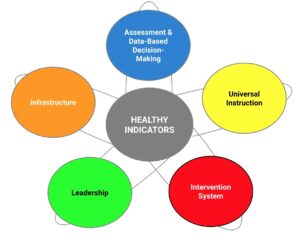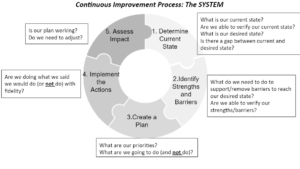Green Hills AEA supports districts and schools in school improvement processes. Many school improvement models incorporate a process of building awareness, assessing needs through public involvement, setting goals, developing and implementing plans, and evaluating results. The agency provides training, materials, networking with other districts, and ongoing staff assistance to the extent possible.
Latest News
Monthly Curriculum Networking Meetings:
Check out the Curriculum Network Website with dates of monthly meetings and archived information!
Join The Zooms Here Check out the Iowa Department of Education Newsroom
Assessment
Iowa School Performance Profile
Iowa School Performance Profiles Website
- Attendance Center Ranking - Ratings Added
- School Overview
- State Summary
- In-Depth View
- All students and reporting view of measures (10 or more students)
- Added to accountability measures
- Comparison Features
- Side by side compare
- School view comparison
- Additional Measures
- Targets and Interim Progress
- Suspension
- Chronic Absenteeism
- Post-Secondary Readiness
- NAEP
- Attendance (ACR)
- Staff Retention (ACR)
FAST (Formative Assessment System for Teachers)
The state of Iowa purchases FAST to support implementation of MTSS in schools. Healthy MTSS systems include screening, progress monitoring, and intervention for students in Grades K-6, using FAST or other approved measures in Iowa. As part of the Early Literacy Implementation legislation, screening, progress monitoring, and intervention are required in Grades K-3 and for students who continue to be persistently at risk beyond third grade. Grades PreK-6 are strongly encouraged to implement these practices. FAST tools are available in Literacy and Mathematics. Resulting screening, progress monitoring, and intervention information is accessed via A&A Portal roles in FastBridge and Panorama Student Success.
Iowa Statewide Assessment of Student Progress (ISASP)
The Iowa Statewide Assessments of Student Progress (ISASP) are statewide assessments developed by Iowa Testing Programs at the University of Iowa for the state of Iowa. The assessments are aligned with the Iowa Core standards and provide a clear and accurate assessment of student learning outcomes. Student growth, proficiency, and readiness indicators will be reported. Follow the link for information; updates are added periodically.
Post Secondary Readiness Reports
The purpose of the Postsecondary Readiness Reports is to support state and local efforts to meet the goal that all Iowa students are prepared for success beyond high school. This state website supports that goal by providing valuable information on how prepared Iowa high school graduates are for success in postsecondary education and community college-based training. The Postsecondary Readiness Reports include information on enrollment in colleges and universities, remedial course-taking rates, and postsecondary retention and completion rates for students who graduated from public high schools in Iowa. These rates are available statewide and by Iowa high school. They are also available by student demographic subgroups, such as minority students and students who are eligible for free and reduced-price lunches.
Also available are Postsecondary Readiness & Equity Partnership Trendlines that show the following indicators by cohort: high school graduation rate, postsecondary intentions, postsecondary enrollments, persistence, and completed postsecondary degree/certificates. Data can be viewed on EdInsight by AEA or District.
Multiple Assessment Requirement Removed
For many years, schools implemented a second assessment in reading, mathematics and science somewhere in the K-12 grade span to meet the requirements of SF 2114. The requirement for school districts and accredited nonpublic schools to demonstrate the use of multiple assessment measures in determining student achievement levels has now been eliminated.
The original document is here (scroll to the bottom of page 3, Section 256.7, subsection 21, paragraph c), and the code reference for the change is here.
While the requirement for a second measure is not currently in code, the use of multiple assessments to monitor student progress on standards remains a best practice.
EdInsight
Users can now access multiple reports regarding students that enroll, persist, and earn a post-secondary degree or certificate. These are found in the Postsecondary Readiness Report family when opening EdInsight. There are options for canned reports, a PREP Dashboard, and a PREP Cube for those with appropriate access.
Users can now access information on two healthy indicators: percent of students screened and percent of students scoring at or above benchmark on universal screeners within the state-defined Fall, Winter and Spring screening windows. A list of default assessments by district and building can be found in the Iowa section of the knowledge base in the FAST system. Screening data are based on exports from the FAST system and do not include data for districts using other universal screening assessments. Data are available grouped by grade, IEP status, and ethnicity. Data cannot currently be grouped by building within the district, nor by district within AEA or State. For now, to make these comparisons users will need to run separate reports.
The Guide to EdInsight Reports provides a definition of each report, a description of the data contained along with a screenshot. This resource can save you time in finding "that one report" you've been seeking.
Cube reports are customized by users. Typically these reports are trying to answer a "unique question" and require users to have a higher level of experience with data analysis. Users identify parameters to build reports to answer the question.
GHAEA Contact: Sherry Huffman, shuffman@ghaea.org
Differentiated Accountability
Iowa's Continuous Improvement Model


Assessment and Data-Based Decision Making
Student Success - Can be accessed via the Education Portal. Here, educators can find the latest literacy and math screening and progress monitoring data, as well as data related to academics, attendance, and behavior. This data system is continually being updated to house more data points and grade levels to assist in data-based decision-making.
Universal Instruction
New Universal Tier Tools v5.0:
We are excited to share these expanded and enhanced Universal Tier Tools! The feedback we have received on the content of earlier versions of these tools has been overwhelmingly positive. We hope that the expansion and enhancements made to these tools will make them even more useful and accessible for Iowa’s educators.
1. Expanded through 12th grade
2. Added preschool - 12th Social-Emotional Behavioral Health
3. Preschool – 12th Grade Think Abouts for Special Education, English Learners and Advanced Learners (Students who are identified for gifted and talented services as well as those high ability/high potential students who need different supports but who may not meet the criteria for a district’s gifted and talented identification)
4. Offer options for division of the guides and protocols into grade spans
5. Expansion of Healthy Indicators/Early Warning System for Assessment and Data-Based Decision-Making
5. Collaborative Inquiry Questions expanded version
6. Expanded definitions including Collaborating for Kids [C4K] List of Definitions and Acronyms: 2019-2020
In addition, the Universal Tier Tools can be accessed via a website bit.ly/uttools.
Intervention System
Intervention System Tools can be accessed via a website: Intervention System Guide
ESSA
Requirements for designated schools include a Resource Allocation Review, Data Review, Self Assessment of MTSS Implementation (SAMI), Action Planning and follow-up check-ins. Your Green Hills AEA School Improvement Consultant will lead and facilitate these conversations through regional sessions or individually developed opportunities with your school.
All the supports within ESSA are available to any school in Iowa. For a description of available online modules, access the ESSA Online Module Descriptions.
-
C4K ESSA Module 1: Data Review
-
C4K ESSA Module 2: Self Assessment of MTSS Implementation (SAMI)
-
C4K ESSA Module 3: Action Planning
-
C4K Introduction to MTSS
-
C4K Assessment Basics
-
C4K Introduction to Universal Instruction






